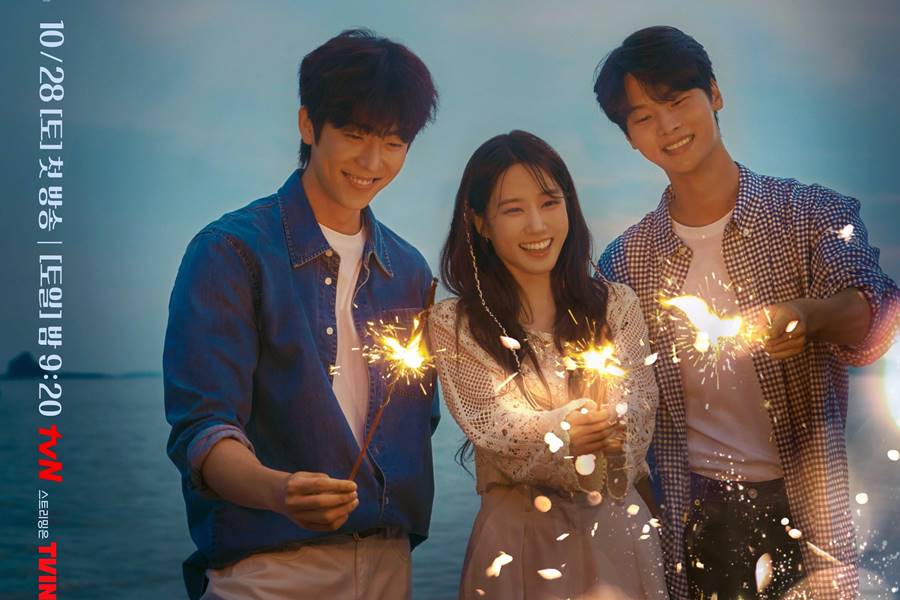
By Jae-Ha Kim
Substack
December 9, 2023
☆☆☆☆
Seo Mok-ha (played by Park Eun-bin)
Kang Bo-geol / Jung Ki-ho (played by Chae Jong-hyeop)
Yoon Ran-joo (played by Kim Hyo-jin)
Kang Woo-hak / Jung Chae-ho (played by N / aka Cha Hak-yeon)
↑Note: Korean names denote the surname followed by the given name.
There is a lot to unpack in “Castaway Diva.” On the surface, it’s about a teenager who has been trapped on an island for 15 years, is rescued, and pursues her dreams of becoming a K-pop idol. And that is an interesting enough premise as it is. However, the real thrust of this K-drama is the long-lasting ramifications of abuse, even after the victims have grown up and have long been separated from the abusers.
Mok-ha and Ki-ho aren’t initially friends at school. Her father owns the local seafood restaurant and his father is a police officer. After a particularly brutal beating, Mok-ha calls the police asking for help. Ki-ho’s father is one of the officers sent to sort out what happened. But instead of consoling the child — who is bleeding and covered in bruises from previous beatings — he basically tells her to be a good girl and understand the pressure her father is under.
Okay???
Previously, Ki-ho had assumed that this happy-go-lucky girl led a privileged life. But after witnessing his father telling her she is at fault, he empathizes with her. Ki-ho tells Mok-ha that the next time her father lays a hand on her, run to his house and he will help her escape. And after another beating, she does exactly that.
Ki-ho has a plan mapped out that will save both of them from their respective fathers. They will head to Seoul so that Mok-ha can meet her favorite singer Ran-joo, who happens to be looking for a talented new singer to mentor. But in order to get there, they have to take a ferry across the river. Trying to escape her father, who has tracked her down, she falls overboard and ends up stranded on an island alone for the next 15 years.
Thankfully, Mok-ha (Park Eun-bin) is rescued in the second episode, so viewers aren’t subjected to endless shots of her eating potatoes and talking to a seagull — her makeshift island friend. Though the scene is played for laughs, it also depicts how desperate we can become when left with no one else for company. Human beings aren’t meant to live in isolation. (Which is why Tom Hanks’ character in “Castaway” created a friend — Wilson — out of a volleyball for companionship.)
In what appears to be a serendipitous encounter, a group of volunteers happens to appear on the island to pick up litter that’s washed up. And she is finally rescued by a pair of brothers. It’s no secret to reveal that they are Ki-ho (Chae Jong-hyeop) and his elder brother Chae-ho (Cha Hak-yeon). (And the latter two go by different sets of names to protect their identities. But to make things a little easier to follow, I’m going to use their birth names.)
What happens next is … bizarre. A woman who’d been trapped on an island for half her life and who had a kinda/sorta tie-in with famous Korean singer Ran-joo would be huge international news. And while on-air reporter Chae-ho does a couple of pieces on her, there’s little hullabaloo around her, which is just weird when you consider how media likes to milk these kinds of feel-good stories. Where are the book deals? Why hasn’t she been invited on morning (and late-night) chat shows to talk about her experience? Why hasn’t she been booked as a participant on South Korea’s reality/survival series “Law of the Jungle”? And where are the TV and film producers optioning the rights to tell her story in movies or television shows?
Nowhere, it seems.
But just as importantly, why does no one suggest that Mok-ha might benefit from seeing a therapist to work through the trauma she has survived? Physical abuse followed by long-term isolation — from the time she was 15 to 30 — is a lot for anyone to process alone. Have we learned nothing about the importance of mental health care from “Daily Dose of Sunshine”?
Mok-ha’s joy at being rescued is nothing compared to the joy she has meeting Ran-joo, who by now has been written off as an alcoholic has-been.
I’d like to take a moment to talk about our lead actress’ talents, not just in acting, but in singing. At first, I was wondering how Park Eun-bin had perfected the art of lip synching all the songs that her character sang. And I thought, “Wow, the singer doing her vocals sounds so much like her.” Then I realized, Park did all her own singing! And she has a lovely voice that suits the songs.
She isn’t the first actor to tackle her own singing. Shim Eun-kyung also beautifully sang her own songs in the delightful Korean film “Miss Granny.” Still, Park’s vocals were a pleasant surprise.
There’s a lot going on in this series that I wanted to briefly address:
• Ki-ho’s abusive father says that he can always find him. He chases criminals who’ve stolen billions of won for a living, so finding his own child won’t be difficult, he threatens. Yeah, not likely. A low-grade police officer in a rural area isn’t going to be called upon to solve a financial crisis.
• When Mok-ha never showed up to meet with Ran-joo — due to being stranded on that island and all — the latter selects another high school singer and helps her become the No. 1 idol in South Korea. Mok-ha and Ran-joo both are of the mind that the idol usurped Mok-ha’s career, and that had Mok-ha not been away for 15 years, she would be the No. 1 singer in Korea. Maybe? But that’s assuming that success is interchangeable. Mok-ha could’ve debuted at 15 and had great success. Or, the public may have not liked her voice, or looks, or song selections, or mannerisms, or just her in general. Fame is the result of talent, opportunity and timing. There are a lot of factors that go into producing a popular idol.
• The writers go out of their way to create a loveline between Ran-joo and Seo-jun (Kim Joo-hun), the president of her record label who wants to push her out of the company. Why? For most of the series, he does everything in his power to fight her. Staring at her with puppy dog eyes every now and then doesn’t alleviate that. And, yes, they make him more sympathetic as the series goes on, but it was too little, too late.
Airdates: Twelve 80-minute episodes aired on tvN from October 28 to December 3, 2023. I watched this on Netflix.
Spoiler Alert:
One of the most touching scenes is when Mok-ha initially lies that even when she was starving, she didn’t eat the eggs that her companion seagull had laid. Later, she reveals that she was so hungry that she did eat them, and has been wracked with guilt ever since. People do what they have to do to survive. However, that doesn’t mean it alleviates our moral culpability. She’s not a vegan, so she didn’t feel guilty about eating the eggs for those reasons. Rather, this bird — who had no idea it was her friend — was her only living companion for years and she had betrayed its trust (from her point of view).
During a beating when their father was attacking the entire family, Chae-ho took a blow that left him comatose. Their mother moved them to a new village. With the help of a local government worker who fell in love with her, they took on the names of a different family that had disappeared with no trace. (Later, we will find out that the latter were victims of suicide. However, it is my contention that it was more likely to be murder/suicide, since two young boys died as well.) So they started off a new life, where the boys’ biological father wouldn’t be able to find them.
The boys’ stepfather (played by Lee Joong-ok) is such a good role model that Mok-ha said until she met him, the word father instilled only fear in her.
When Ki-ho’s bio father tracks them down and reports them to the police for identity theft, everyone worries that if convicted, Ki-ho might have to go to jail, too. (Chae-ho was comatose and woke up with no memory, other than what he was told. There’s medical evidence to keep him out of jail.) But my question is, why would an underage child be sent to prison? If his parents changed his name, he had no recourse as a minor but to accept it. Even if he knew that what they did was illegal, how can they hold a child responsible for the choices his mother and stepfather made?
In South Korea, no matter how heinous the crime, a child under 14 will not serve any jail time. Assuming Ki-ho was older than 14, it’s still a fact that he’s not the one who committed identity theft.
There is a subplot involving Ran-joo and her mother that meandered and felt out of place. However, the two shared some lovely vignettes, especially in her mother’s last few days. Ran-joo is filled with grief after she learns that her mom gave up her singing career to raise her. But again, that wasn’t her fault. And just as importantly, her mother — elegantly portrayed by Moon Sook (“The Uncanny Counter”) — never viewed her as a burden.
I know a lot of parents will agree with me when I say that parenting is one of the most difficult jobs out there. There is no time away from it. But just about any parent will tell you — any sacrifices that we made were our choices. Loss of a dream isn’t the child’s fault. Things happen in life and we roll with it. Dreams evolve and they can be just as fulfilling as anything else. And if they’re not, that’s OK, too.
At the end of Episode 11, the mother’s death scene is beautifully and poignantly portrayed. And Ran-joo’s reactions are realistically appropriate — a sad daughter who prepared for this moment, but still grieves nonetheless.
QUOTE ME:
I’m often asked for background material or quotes for articles. While I don’t always have time to help as much as I can, I do try. An article recently appeared where my quotes were ultimately cut out. I got the impression that the essay — which was written for an airline publication (and therefore had a vested interested in getting people to buy tickets to South Korea) — didn’t want to hear my comments about viewers having unrealistic expectations about the country.
Or…it was just cut for space. 😂
So, without further ado, I’m sharing those quotes here in my space:
Q: Why do you think non Koreans — especially Americans — are so bonkers for K-dramas that they’d actually travel to Korea for them?
Jae-Ha Kim: I think it’s a convergence of a lot of things: the visibility of South Korea via K-dramas, K-pop, Korean food and Korean skincare. They all play a part in making South Korea an attractive destination for tourists. But, on the other hand, what I have seen on social media, though, is that some tourists have expectations that were based on a fantasy that doesn’t exist. Not all Korean men look like Gong Yoo. Not every halmoni is a sweetheart. Not everyone is going to bend over backwards to welcome you to their country. And when these unrealistic expectations aren’t met, they vent online: Koreans were rude to them, Koreans didn’t respect the elderly on public transportation, Korean shops weren’t as good as what was offered in Japan — that kind of thing.
Q: What’s it like for your own family?
Jae-Ha Kim: I grew up watching K-dramas with my parents, who watched an episode or two every night after work. Because we only had access to a limited number of shows that our local Korean grocer rented out to customers, my parents watched and rewatched them to make sure they got their money’s worth before returning them. Korean shows are my favorite form of entertainment. And my husband and child love them, too. Our son doesn’t remember all the actors’ names, but he’ll point out that the buff guy (Ma Dong-seok) from “Train to Busan” is in “Bros” or that the actress (Park Shin-hye) from “Memories of Alhambra” is in “Sisyphus: The Myth.”
Maybe a month or so ago, my son had a non-Korean classmate over. They wanted to watch a movie. I didn’t recommend anything Korean, because I didn’t think his friend would want to deal with subtitles. But as they were scrolling through Netflix, his friend saw that the Korean zombie movie “Alive” was an option and said, “I heard this is good.” They watched it and both loved it! (It is good! I will review it eventually.)
This is a totally different experience than my own childhood. And I am so pleased that unlike my childhood, my teen is growing up in an era where Korean pop culture is celebrated.
© 2023 JAE-HA KIM | All Rights Reserved






2 thoughts on ““Castaway Diva” (무인도의 디바)”